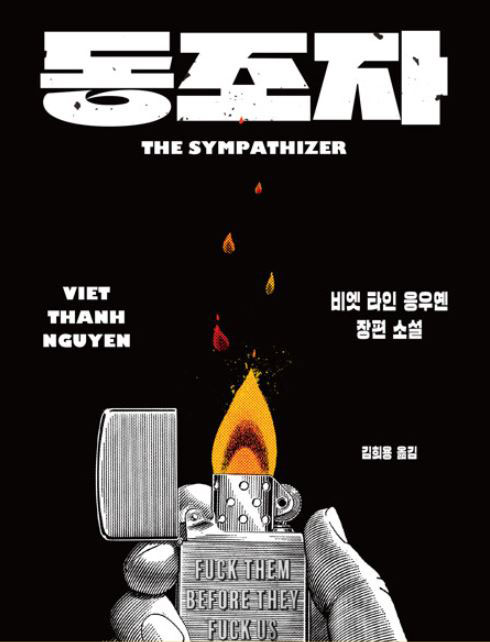
Winner

The Sympathizer (2016)
‘As a captain in the South Vietnamese army and secret agent for the CIA, I fled to the US with the family of a general, my superior, right before the fall of Saigon in April 1975. However, I was actually a resident spy who had been planted in the south by North Vietnam. After emigrating to the US I lived as a migrant and double agent, spying on Vietnamese people and passing on information.’
This novel offers insight into the hidden side of Vietnamese and American society directly after the Vietnam War through pointed, humorous and satirical prose and highly experimental literary devices.

Viet Thanh Nguyen
American novelist and professor who was born in Vietnam on March 13, 1971. Nyugen grew up in the US after moving there with his whole family following the fall of Saigon in 1975. He majored in English Literature and Ethnic Studies at UC Berkeley, and is currently teaching English Literature and American Studies and Ethnicity at USC.
Nyugen released his first full-length novel The Sympathizer in 2016. This book went on to win the 2016 Pulitzer Prize and also swept up a host of other awards including the Carnegie Medal for Excellence in Fiction, the Dayton Literary Peace Prize, the Edgar Award for Best First Novel from an American Author, the Asian/Pacific American Award for Literature in Fiction and the California Book Award for First Fiction. The Sympathizer was also chosen as book of the year by multiple media outlets including the New York Times, The Guardian, the Wall Street Journal, Slate and the Washington Post. Nyugen a book of short stories titled The Refugees in February 2017, and published The Committed as a sequel to The Sympathizer in 2022.

Hee-Yong KIM
Hee-Yong KIM graduated from Ewha Womans University’s Department of English Language and Literature, and later completed her PhD studies at the same graduate school. She is currently a professional novel translator and has lectured at Baewha Women's University, Gangseo University and Sungkyul University, among others. In addition to The Sympathizer, KIM’s translated works include The History of the Decline and Fall of the Roman Empire by Edward Gibbon (joint translator), O. Henry Short Stories by O. Henry, A Christmas Carol by Charles Dickens, The Heart Goes Last by Margaret Atwood, The Farm by Joanne Ramos, Normal People by Sally Rooney, Washington Black by Esi Edugyan and Viet Thanh Nguyen’s latest novel The Committed.
A Novel That Cuts to the Heart of Diaspora
There is already much that we know about the Vietnam War—the tragic end of the war in 1975, the boat people, the Korean military’s role in the fighting, and Vietnam’s postwar economic growth. We have also heard something about the lives of Vietnamese refugees in the United States.
Nevertheless, all those facts are merely fragments of the whole, distorting the true story that remains shrouded in darkness. Who was the winner, and who the loser of this war? Who was the aggressor, and who the victim? How can we divvy up shares of responsibility and victimhood for the violence and destruction that was perpetrated in Vietnam? Could it be that the attitudes adopted toward Vietnam in the United States and elsewhere in the world—sometimes hostile, sometimes amicable—actually represent some kind of unconscious urge to justify ourselves?
In his novel The Sympathizer, Viet Thanh Nguyen digs straight into the vein of such doubts and confusions. The book’s unnamed narrator is a biracial child of colonizer and colonized, as well as occupying the unique position of a double agent working for the two warring governments of Vietnam. Already, this hints at the polarity and inscrutability of the “Vietnam issue.” Moving beyond that, the narrator is both an objective observer of the events of the book and a participant in those events, a dual nature that advances the plot through his bifurcated gaze. By way of this distinctive structure, the author reveals how all people involved in Vietnam’s history are reduced to accomplices to evil because all their constructive efforts end up furthering the destruction of their country.
If that predicament were boiled down to a single sentence, it would probably be the following fact: “Nobody can represent the state, but the state functions as the basis for everyone’s existence.” Furthermore, even though the absence of the state turns everybody into a phantom, the traces they leave behind are nonetheless genuinely human. Therefore, this book serves as both record and judgment of everyone’s experience of the Vietnam War.
That is how this book transcends the experience of Vietnamese immigrants to cut to the heart of diaspora. All of us seek to find our true selves, but the self can only exist in our relationships with other people. The fundamental question of diaspora, be that positive or negative, lies in the paradox of the preceding sentence.
The author’s skill in delving into the heart of the matter is not only evident in the book’s plot. Considering that one of the primary reasons for reading literature is to savor the texture of language, his evocative figures of speech, careful arrangement of events, and clever use of word play succeed at transmuting readers’ feelings about the book’s theme into their own personal experience. This makes for something of an “out-of-body experience” for Korea-based readers, who are transported far above the earth to mull the significance of the book’s events. The author once remarked, “I want readers to be rattled by the book.” Readers soon find that he is being quite serious.